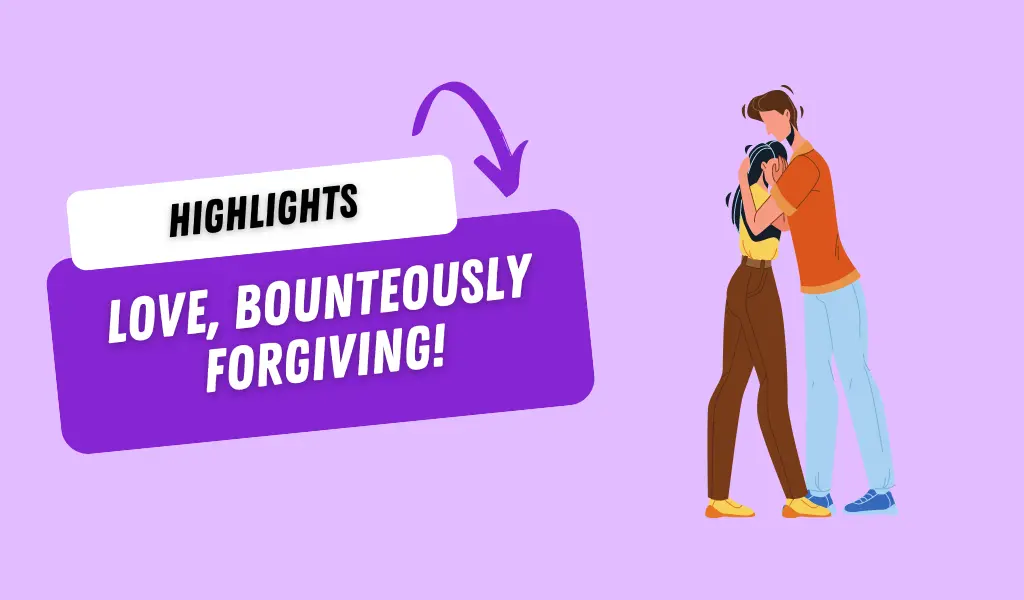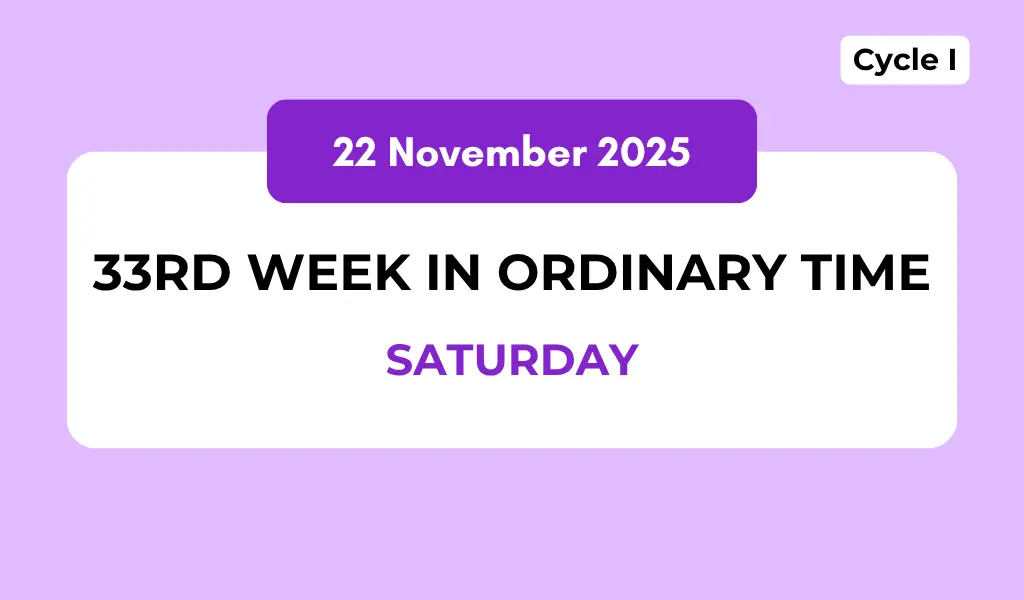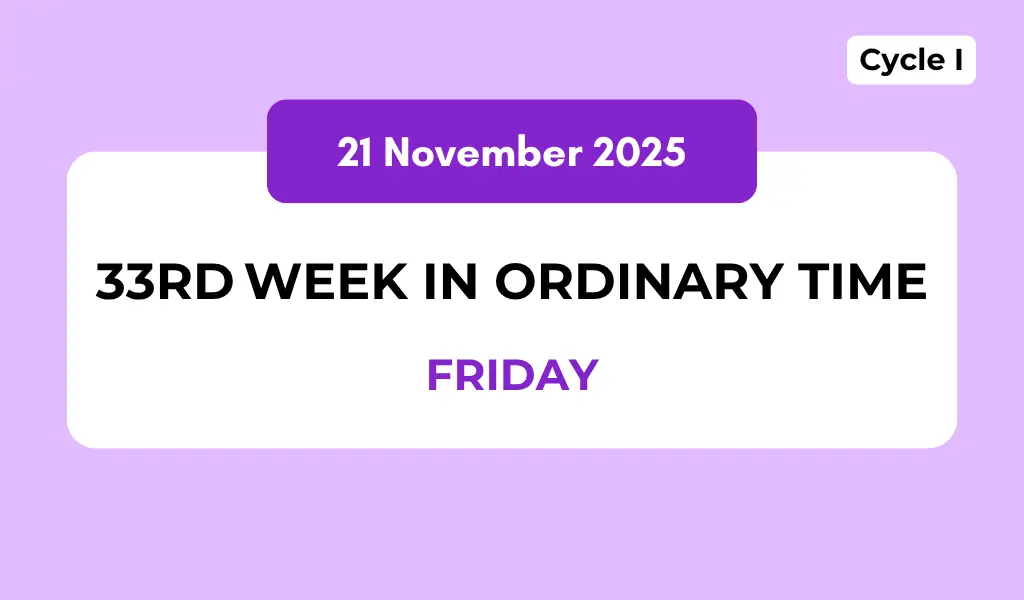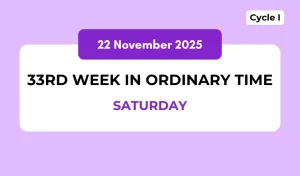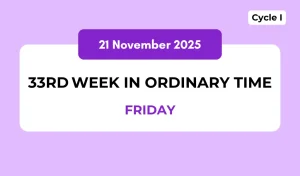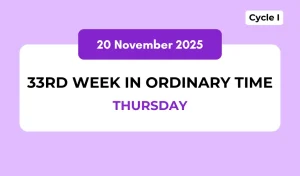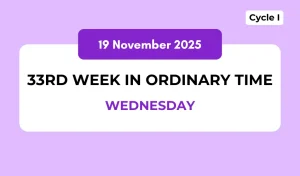Second Week of Lent
02nd March 2024 (Saturday)
Psalter: Week 2
Reading of the Day
First Reading: Micah 7:14-15, 18-20
Shepherd your people, [O Lord,] with your staff, the flock of your inheritance, who dwell alone in a forest in the midst of a garden land; let them graze in Bashan and Gilead as in the days of old. As in the days when you came out of the land of Egypt, I will show them marvelous things. Who is a God like you, pardoning iniquity and passing over transgression for the remnant of his inheritance? He does not retain his anger for ever, because he delights in steadfast love. He will again have compassion on us; he will tread our iniquities underfoot. You will cast all our sins into the depths of the sea. You will show faithfulness to Jacob and steadfast love to Abraham, as you have sworn to our fathers from the days of old.
Psalm 103:1-2, 3-4, 9-10, 11-12 (R. 8a)
R/. The Lord is compassionate and gracious.
Verse Before The Gospel
V/. Glory and praise to you, O Christ
R/. Glory and praise to you, O Christ
V/. I will arise and go to my father, and I will say to him; Father, I have sinned against heaven and before you
R/. Glory and praise to you, O Christ.
Gospel : Luke 15:1-3, 11-32
At that time: the tax collectors and sinners were all drawing near to hear him. And the Pharisees and the scribes grumbled, saying, “This man receives sinners and eats with them.” And he said, “There was a man who had two sons. And the younger of them said to his father, ‘Father, give me the share of property that is coming to me.’ And he divided his property between them. Not many days later, the younger son gathered all he had and took a journey into a far country, and there he squandered his property in reckless living. And when he had spent everything, a severe famine arose in that country, and he began to be in need. So he went and hired himself out to one of the citizens of that country, who sent him into his fields to feed pigs. And he was longing to be fed with the pods that the pigs ate, and no one gave him anything. “But when he came to himself, he said, ‘How many of my father’s hired servants have more than enough bread, but I perish here with hunger! I will arise and go to my father, and I will say to him, “Father, I have sinned against heaven and before you. I am no longer worthy to be called your son. Treat me as one of your hired servants.”’ And he arose and came to his father. But while he was still a long way off, his father saw him and felt compassion, and ran and embraced him and kissed him. And the son said to him, ‘Father, I have sinned against heaven and before you. I am no longer worthy to be called your son.’ But the father said to his servants, ‘Bring quickly the best robe, and put it on him, and put a ring on his hand, and shoes on his feet. And bring the fattened calf and kill it, and let us eat and celebrate. For this my son was dead, and is alive again; he was lost, and is found.’ And they began to celebrate. “Now his older son was in the field, and as he came and drew near to the house, he heard music and dancing. And he called one of the servants and asked what these things meant. And he said to him, ‘Your brother has come, and your father has killed the fattened calf, because he has received him back safe and sound.’ But he was angry and refused to go in. His father came out and entreated him, but he answered his father, ‘Look, these many years I have served you, and I never disobeyed your command, yet you never gave me a young goat, that I might celebrate with my friends. But when this son of yours came, who has devoured your property with prostitutes, you killed the fattened calf for him!’ And he said to him, ‘Son, you are always with me, and all that is mine is yours. It was fitting to celebrate and be glad, for this your brother was dead, and is alive; he was lost, and is found.’”
Daily Gospel Reflection
Highlight: Love, bounteously forgiving!
Guidelines: The greatest beauty of our God is His mercy and eagerness to forgive us and re-embrace us, no sooner than we repent and return to Him
1. The prayer in Micah is a reaffirmation of God’s unconditioned and untiring mercy to forgive and restore His people to prosperity and bliss. The parable of the prodigal son in the gospel is a vivid illustration and dramatization of this truth.
2. What is noteworthy and praiseworthy is the unfailing love of the father. He readily forgets and forgives the whole perversion of the prodigal son and the ruin he brought about. He has no rebukes, no blames, no lessons on morality, no reminders about his past wrongdoings, no conditions to accept back.
3. There are no renewal programs or punitive measures. The point here is not to dispute whether doing wrong is culpable and punishable or not. It is also not undermining the value of preventive, reformative or retributive measures.
4. The whole focus and emphasis is on the mercy of the Father which has no bounds and no reasons. He knows that his son realized and repented. It is enough that he returns and mends his ways. The faulty past does not matter but the changed present. What he was or what he did till then, does not matter, but what he will be and what he will do then on, will only matter.
5. The elder son is a typical human character like many of us: so self-righteous, judging and condemning others. Strictly speaking, he has nothing to lose, with the return of his younger brother.
6. What are his due remain – his share of the property, his respect, his position, etc. Is he feeling bad that he could not be “free” and “enjoy” like his brother? Is he feeling sad that his obedience and discipline are a waste? Does he feel jealous and he cannot digest the fact that his brother is restored to his lost dignity, which he does not deserve at all?
Practice: God’s mercy and forgiveness, His eagerness to reconcile and restore us are our richest founts of hope and consolation. These should drive us to sincere repentance and not a tendency to take for granted.
